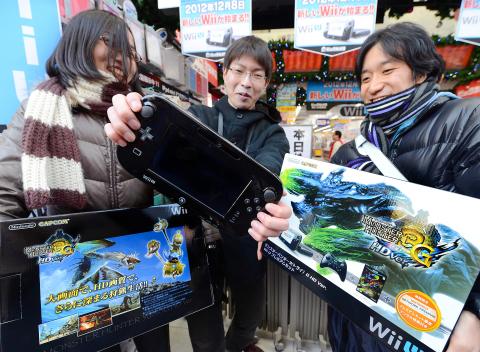Nintendo Co’s Wii U home video game console debuted in Japan today after sales of its 3DS handheld player drove an expansion of the country’s videogame market in the first half of the year for the first time in five years.
The videogame maker’s first home console since 2006 comes in two versions, at ¥26,250 (US$319) and ¥31,500, with a 6.2-inch touch-screen controller called the GamePad.
US customers bought 400,000 units in the first week of sales that started on Nov. 18, the company said on Nov. 26.

Photo: AFP
The high-definition Wii U’s GamePad lets users wirelessly connect to the console so characters can jump between the device and a TV, a feature Kyoto-based Nintendo is betting will help lure players away from smartphones and tablets.
Japan, the world’s third-largest economy, is also the fastest growing major videogame market, as demand in the US and Europe slumps.
“Nintendo has a better chance to succeed in Japan, as they have more strongly rooted fans at home,” said Satoru Kikuchi, an analyst at Deutsche Bank AG. Still, “success in the US is required to generate profits.”
Yodobashi Camera Co’s store in Tokyo’s electronics shopping district of Akihabara opened at 8am, two hours earlier than usual, as about 100 people lined up to buy the Wii U. The store could not give figures on Wii U sales today.
“I’ve been waiting for this for so long and I’m thrilled to finally get it,” Ryoji Iriyama, 41, said after purchasing the console and Super Mario Bros U software at Yodobashi Camera. “I’m going to play this with my daughter as soon as I get home.”
US consumers spent 11 percent less on video games, consoles and accessories last month than a year earlier, led by fewer purchases of consoles and handheld players.
Retail spending on the products totaled US$2.55 billion last month, down from US$2.87 billion a year earlier, industry researcher NPD Group Inc said in an e-mailed statement.
Industry-wide sales of videogame machines and software jumped 11 percent to ¥175.3 billion in Japan in the six months ending Sept. 30, according to Enterbrain Inc.
Nintendo led the gain after boosting sales of its 3DS handheld unit by cutting prices and introducing its New Super Mario Bros U and Capcom Co’s Monster Hunter 3 (Tri) G.
In Japan, Nintendo may face a challenge from its own handheld players, besides competition from smartphones and tablet computers such as Apple Inc’s iPhone and iPad, said Tomoaki Kawasaki, a Tokyo-based analyst at Iwai Cosmo Holdings Inc.
Nintendo aims to sell 5.5 million Wii Us and 17.5 million 3DSs this fiscal year, it forecast in October.
“Nintendo must offer a very distinctive feature to convince consumers to spend more than ¥30,000 to play with the Wii U,” he said. “Nintendo needs to expand its range of customers.”

SEEKING CLARITY: Washington should not adopt measures that create uncertainties for ‘existing semiconductor investments,’ TSMC said referring to its US$165 billion in the US Taiwan Semiconductor Manufacturing Co (TSMC, 台積電) told the US that any future tariffs on Taiwanese semiconductors could reduce demand for chips and derail its pledge to increase its investment in Arizona. “New import restrictions could jeopardize current US leadership in the competitive technology industry and create uncertainties for many committed semiconductor capital projects in the US, including TSMC Arizona’s significant investment plan in Phoenix,” the chipmaker wrote in a letter to the US Department of Commerce. TSMC issued the warning in response to a solicitation for comments by the department on a possible tariff on semiconductor imports by US President Donald Trump’s

‘FAILED EXPORT CONTROLS’: Jensen Huang said that Washington should maximize the speed of AI diffusion, because not doing so would give competitors an advantage Nvidia Corp cofounder and chief executive officer Jensen Huang (黃仁勳) yesterday criticized the US government’s restrictions on exports of artificial intelligence (AI) chips to China, saying that the policy was a failure and would only spur China to accelerate AI development. The export controls gave China the spirit, motivation and government support to accelerate AI development, Huang told reporters at the Computex trade show in Taipei. The competition in China is already intense, given its strong software capabilities, extensive technology ecosystems and work efficiency, he said. “All in all, the export controls were a failure. The facts would suggest it,” he said. “The US

The government has launched a three-pronged strategy to attract local and international talent, aiming to position Taiwan as a new global hub following Nvidia Corp’s announcement that it has chosen Taipei as the site of its Taiwan headquarters. Nvidia cofounder and CEO Jensen Huang (黃仁勳) on Monday last week announced during his keynote speech at the Computex trade show in Taipei that the Nvidia Constellation, the company’s planned Taiwan headquarters, would be located in the Beitou-Shilin Technology Park (北投士林科技園區) in Taipei. Huang’s decision to establish a base in Taiwan is “primarily due to Taiwan’s talent pool and its strength in the semiconductor

French President Emmanuel Macron has expressed gratitude to Hon Hai Precision Industry Co (鴻海精密) for its plan to invest approximately 250 million euros (US$278 million) in a joint venture in France focused on the semiconductor and space industries. On his official X account on Tuesday, Macron thanked Hon Hai, also known globally as Foxconn Technology Group (富士康科技集團), for its investment projects announced at Choose France, a flagship economic summit held on Monday to attract foreign investment. In the post, Macron included a GIF displaying the national flag of the Republic of China (Taiwan), as he did for other foreign investors, including China-based